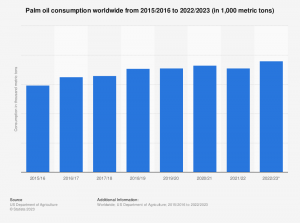The palm oil consumption in human nutrition dates back many thousands of years. Nowadays, Its production has increased rapidly over the past 50 years. In 1970, the world was producing only 2 million tonnes. This is now 35 times higher: in 2018 the world produced 71 million tonnes.
What are the benefits of palm oil?
Its popularity came in the second half of the 20th century, as a replacement for foods such as hydrogenated fats and margarines. Because it was considered a viable substitute for the fat part needed in the processing of many consumer industry products, palm oil gained as a result an increasingly large share of the market for several reasons. Firstly, its composition made up of saturated fats has shown similar qualities to butter, an exception among vegetable by-products. In addition, its significantly lower cost, its tasteless taste that does not alter the palatability of food, and its longer shelf life than butter have made it a success with the large food industry.
Palm oil is an incredibly efficient crop, producing more oil per land area than any other equivalent vegetable oil crop. It is a versatile product whis is used in a range of products across the world: food, industrial applications, Bioenergy, cosmetics and personal care, oleochemicals and livestock.
As well as being versatile, the oil palm is a very efficient crop, able to produce high quantities of oil over small areas of land, almost all year round.
Where is mostly produced?
Globally, palm oil supplies 40% of the world’s vegetable oil demand on just under 6% of the land used to produce all vegetable oils. To get the same amount of alternative oils like soybean, coconut, or sunflower oil you would need anything between 4 and 10 times more land, which would just shift the problem to other parts of the world and threaten other habitats, species and communities.
Indonesia and Malaysia supply 84 per cent of the palm oil used globally but more and more palm oil is imported from Latin America. In Indonesia and Malaysia together, approximately 4.5 million people earn a living from palm oil.
Asia is by far the largest and fastest-growing consumer of palm oil, responsible for two thirds of global consumption. The three largest consuming nations are Indonesia, India and China which between them account for 45 per cent of global demand. The European Union is also a big consumer of palm oil. China and the EU do not produce palm oil and their demand is entirely met by imports. In 2018, India, China and the EU accounted for 43.9 per cent of global imports.
Palm oil consumption worldwide from 2015\2016 to 2022/2023
- (in 1,000 metric tons)
This statistic shows the palm oil consumption worldwide from 2015/2016 to 2022/2023. In 2018/2019, the palm oil usage amounted to over 71 million metric tons worldwide. That figure is projected to increase to approximately 76 million metric tons by 2022/2023.
To learn more about palm oil look this article!


